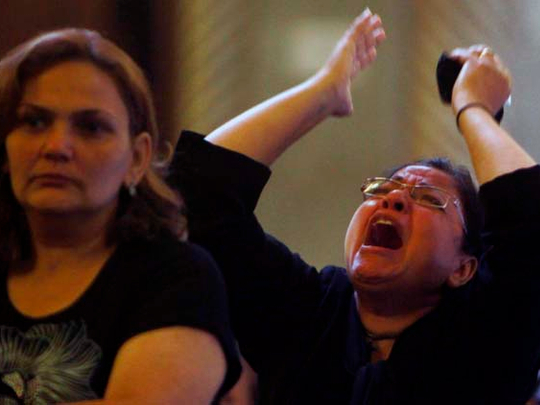
Some of the coverage of killing Coptic Christian demonstrators in Cairo a few days ago was based on the traditional notion of sectarian strife in Egypt between the Muslim majority and Christian minority. Noting the tension between the two communities for the last four decades, and the disinformation by Egyptian media, one might find some excuse for those who get their information about Egypt second-hand. Yet some ‘western' and local analysts are captives of their own arrogant dogma and can't see any change in the region.
What happened on October 9 on Corniche Al Nile in front of Maspero building that houses state Radio and Television was a culmination of a trend by the new interim rulers who assumed power in Egypt after the popular revolt ousted president Hosni Mubarak. The Supreme Council of Armed Forces (Scaf) vowed to hand over power to an elected civilian administration in six months — that ended on August 11. During those nine months, Scaf had a weak government and was only trying to maintain the status quo until power was handed over. People are becoming more frustrated, left with the feeling that they only revolted to replace Mubarak with other rulers.
The old generals of Scaf couldn't understand the popular anger, and bought the advice of the shamed State Security Agency about the situation and how to handle it: Hundreds of enthusiastic youth are seeking chaos, but the silent majority would favour stability.
That's why Egyptians, nine months after Mubarak, think things are worse than before: hundreds of youth jailed by the military, Muslim Brotherhood being appeased by the Scaf then abandoned, talking about foreign conspiracies to destabilise the country, instigating sectarian violence by playing on deep-rooted tensions between Christians and Muslims. Yet, the October 9 attack on peaceful Christian demonstrators, which led to the deaths of about two dozen people — some mowed down by army vehicles, exactly like the scenes of January 20, when security vehicles mowed anti-Mubarak protesters — was the most bloody crackdown by the regime against the people. The media was used to ignite sectarian fires by propagating lies about Christians attacking the army and security forces. Luckily that ploy didn't work, and Islamists said to themselves: "We're not going to fight for the generals or the security forces against the Christians." So, it ended as purely a military oppression of demonstrators.
It was similar to scenes of the crackdown on protesters on September 9, when the security forces picked up dozens of activist youth (who are still in jail) and let thugs who broke into the Israeli embassy go free. Those killed in front of Maspero on October 9 are also activists — Meena Daniel is a striking symbol of the revolutionary Egyptian youth who led the revolt against Mubarak. Christian protests against the attack on a makeshift church in Upper Egypt have been going on for days before October 9, and it seems the regime didn't succeed in provoking Islamists to attack them. Hence, it intervened forcefully to crush the protest and possibly get the sympathy of Islamists. That view of events is not meant to ignore inherent tensions between Egyptian Muslims and Christians, but just to put the latest events in the context of the fact that the interim rulers are just a continuation of the Mubarak regime. Every day, every event and every decision proves this fact.
Patriotic cause
Sectarian strife in Egypt is real, and the minority feels it more than the majority as injustice inflicted on them is severe. The regime always played on these tensions for internal and external purposes, especially since mid-seventies when former president Anwar Sadat ignited the first major sectarian fire when he was cosying up to Islamists. The animosity between the two communities increased. Even when State Security deprives a Christian of his right no anger is directed against the regime but against ordinary Muslims — of course the security apparatus is predominantly Muslim. Dogmatic Islamists and those influenced by working and living abroad, also helped feed that tension and animosity. No national patriotic cause (like war against a common enemy as in 1973) could heal these rifts.
When people (Christians and Muslims) had a common cause, to topple the corrupt and oppressive regime of Mubarak, earlier this year, they went beyond these sectarian rifts. The only loser is the regime, and as it is still there it will try to break that unity — accusing youth of implementing ‘foreign agendas', targeting activists by killing or jailing them, instigating sectarian violence. These are the practices of Mubarak and his State Security apparatus.
One of the results of the bloody crackdown is that more people (mainly Muslims) in Egypt started to see things as they are and possibly understand the problems of the Christians — that's the first step in tackling it rather than burying it under rhetorical slogans of national unity. I really liked what some Christian youth said against the compromising attitude of their clergy — exactly like what some Islamist youth said about the words of their shaikhs and leaders. These young people are determined to fight peacefully for their rights. There's still a common cause: getting rid of the Mubarak regime and all its remnants to build a new Egypt.
Dr Ayman Mustafa is a London-based Arab writer.









